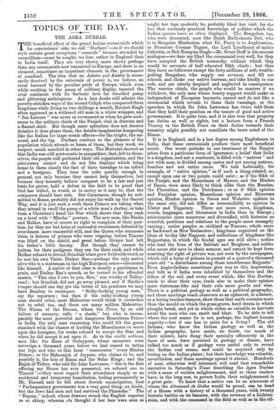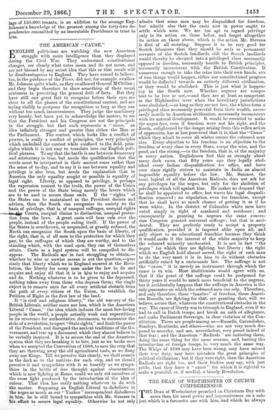TOPICS OF THE DAY.
THE AGRA DURBAR.
THE beneficial effect of the grand Indian ceremonials which
for convenience' sake we call " Durbars"—as if we should style certain great receptions " councils " because attended by councillors—must be sought, we fear, rather in England than in India itself. They are very showy, more showy perhaps than any ceremonials now transacted in Europe, and show is an element, sometimes an important element, in the government of mankind. The idea that an Asiatic quel Asiatic is neces- sarily deceived by the externals of power is, we believe, an error fostered by the peculiar pride of Europe, which even while exulting in the pomp of military display, taunted the rival continent with its barbaric love for tinselled pomp and glittering nothingness. As a fact Arabs still admire the poverty-stricken ways of the second Caliph who conquered three kingdoms while living on two shillings a month, Runjeet Singh often appeared as a withered old man in a white wrapper, and "Jan Larrens " was never so reverenced as when he gave audi- ences to the military chiefs of the Punjab clad in drawers and a flannel shirt. But though mere splendour does not deceive Asiatics it does please them, the Asiatic imagination hungering like the Italian for large scenic effects—for the bright, the un- usual, and the big. Durbars conduce to the pleasure of the population which attends or hears of them, but they work, we suspect, much mischief in other ways. The Mutinies showed us that India was still aristocratic in sympathies, that, left to them- selves, the people still preferred their old organization, and the aristocracy cannot and do not like displays which bring home to them closely the fact of their vassalage to an infidel and a foreigner. They bear the yoke quietly enough in general, not only because they cannot help themselves, but because they honestly believe conquest to be a fair and just basis for power, hold a defeat in the field to be proof that God has willed, in wrath or in mercy as it may be, that the conqueror should bear rule. But Caractacus, though he sub- mitted to Rome, probably did not enjoy his walk up the Sacred Way, and it is just such a walk these Princes are taking when they attend to swell the pomp of a white man's durbar, or take from a Christian's hand the Star which shows that they rank on a level with " bilecha " prestors. The new men, like Sindia and Holkar, have of course no right to complain of their posi- tion, for they are but heirs of successful swordsmen defeated by swordsmen more successful still, and the Queen who summons them is heiress of princes who were reigning before Timour was lifted on the shield, and great before Sivajee had left his father's little barony. But though they cannot be jealous for their pedigrees they can for their rank, and while Holkar refused to attend, Scindiah's face grew livid with wrath as he saw his own Vizier, Dinlmr Rao—perhaps the only native alive who is a statesman in the high European sense—decorated like himself. A native of that class is usually a gentleman in grain, and Dinkur Rao's speech, as he turned to his offended master, "This also I owe to you, Sire," was worthy of Talley- rand ; but Scincliah did not go away pleased, and if Sindia's temper should one day get the better of his prudence we may have Bombay to reconquer. "Sulky-looking young man," say the reporters ; but then if the sulky-looking young man should rebel, most Mahrattas would think it cowardice not to rebel too, and there are many million Mahrattas. The Nizam of the Deccan, whom the Times, by an odd failure of memory, calls "a shade," but who is incom- parably the most powerful and dangerous Mussulman Prince in India, the only man remaining who could lift the green standard with the chance of hurling the Mussulmans en masse upon the foreigner, for weeks refused to accept the Star, and when he did accept it sat upon it. As to the vieille noblesse, men like the Rana of Oodeypore, whose ancestors were sovereign a thousand years before we had ceased to tattoo our legs, and who to this hour " consecrates " every Hindoo Prince ; or the Maharajah of Jeypore, who claims to be, and possibly is, the heir of Rama and the Solar Kings ; and the Rajah of Tirhee, who told Sir John Lawrence, "this is the first offering my House has ever presented, we refused one to Timour "—they must regard their attendance simply as an accidental and temporary humiliation, feeling permanently as Mr. Disraeli said he felt about Jewish emancipation, that "Parliamentary government was a very good thing, no doubt, but the Jews had seen and had survived the Pharaohs." The "Begun," indeed, whose drawers struck the English reporter as so skimp, whereas she thought if her face were seen so a
might her legs modestly be, probably liked her visit, for she has that curiously practical knowledge of politics which the Indian queens have so often displayed. The Bengalees, too, who were decorated, men like Rajah Radhakanta Deb, who is to Bengalee Hindooism what Dr. Pusey is to Anglicanism, or Prosunno Coomar Tagore, the Lord Lyndhurst of native Calcutta, or Deb Namyun Singh—Mr. Grant Duff is his nearest analogue—wedare say liked the ceremonial very well, for they have accepted the British monarchy, without which they would be servants of half educated Sikh chiefs ; but then they have no followers except the forty millions of soft, wealth- getting Bengalees, who supply our revenue, and fill our schools, and choke our native bureaus, and take kindly to our rule, and are utterly despised and neglected in consequence. The warrior chiefs, the people who would be masters if we withdrew, the only men whose hearty support would make us independent of European bayonets, cannot and do not like a ceremonial which reveals to them their vassalage, or the speeches in which Sir John Lawrence has twice told them that they hold their position on the tenure of good and active government. It is quite true, and it is also true that property has duties as well as rights, but a lecture from a Frenoh Viceroy to the British Peers on their duties towards their tenantry might possibly not conciliate the inner mind of the House.
It is in England, and in a less degree among Englishmen in India, that these ceremonials produce their most beneficial result. Our worst mistake in our treatment of the Empire arises from a particular form of ignorance, a belief that India is a kingdom, and not a continent, is filled with " natives " and not with men, is divided among castes and not among nations, families and not entire races. We talk habitually, for example, of "native opinion," as if such a thing existed, or, except upon one or two points, could exist ; as if the Sikh of the Punjab, and the Mussulman of Mysore, and the Hindeo, of Dacca, were more likely to think alike than the Russian, the Florentine, and the Dutchman ; or as if Sikh opinion and Punjabee opinion, Mussulman opinion and Ifysorean opinion, Hindoo opinion in Dacca and Wahabee opinion in the same city, did not differ as irreconcilably as opinion in Ulster and Tipperary. There are more races, kingdoms, creeds, languages, and literatures in India than in Europe; aristocracies more numerous and diversified, with histories as eventful, positions and relations to the people more strangely varying ; entire peoples as civilized as Tuscans, whole races as backward as New Zealanders ; kingdoms organized on the ideas of to-day like Nagpore, and collections of kingdoms like Rajpootana, in which the feudal ages are still alive ; nobles who lead the lives of the Salviati and Borghese, and nobles who never stir save in chain armour, and cannot be kept from asserting the right of private war, not even by the newspapers, which call a foray of princes in pursuit of a quarrel a thousand years old "a disturbance among those troublesome Rajpoots." Even Anglo-Indians sometimes give way to this impression, and talk as if India were inhabited by themselves and the tillers of the soil, and every event which, like this Durbar, tends to clear their eyes, tends also to make their opinion more statesman-like and their rule more gentle and wise. There is a political geology as well as a political geography, and these meetings teach observers as an upheaval, or a fissure, or a boring teaches farmers, show them that earth contains more than the mould on which the grass grows, hard strata in which ploughs break, and yet in which riches as valuable as harvests await the man who can smelt and blast. To be able to tell where the coal seams lie is not, perhaps, the highest human capacity—lint if one has to mine for a living ? The old Indians, who know the Indian geology as well as the Indian geography, have made, no doubt, too much of their science, have flung their specialty offensively in the faces of men, have persisted in geology at dinner, have talked too much as if geology were useful only to reveal the Indian coal seams, and could be acquired only by boring on the Indian plains ; but their knowledge was valuable, nevertheless, and these meetings spread it abroad. Hundreds of men, otherwise well informed, will read that remarkable narrative in Saturday's Times describing the Agra Dnrbar with a sense of sudden enlightenment, and as those readers have, in the long run, to govern India, their enlightenment is a great gain. To know that a native can be an aristocrat of whom the Almanach de Gotha would be proud, can be head of a House with a history of a thousand years, with twenty historic battles on its banners, with the revenue of a Lichten- stein, and with the command in the field as well as in the vii-
lage of 150,000 tenants, is an addition to the average Eng- lishman's knowledge of the greatest among the forty-two de- pendencies committed by an inscrutable Providence in trust to him.































 Previous page
Previous page